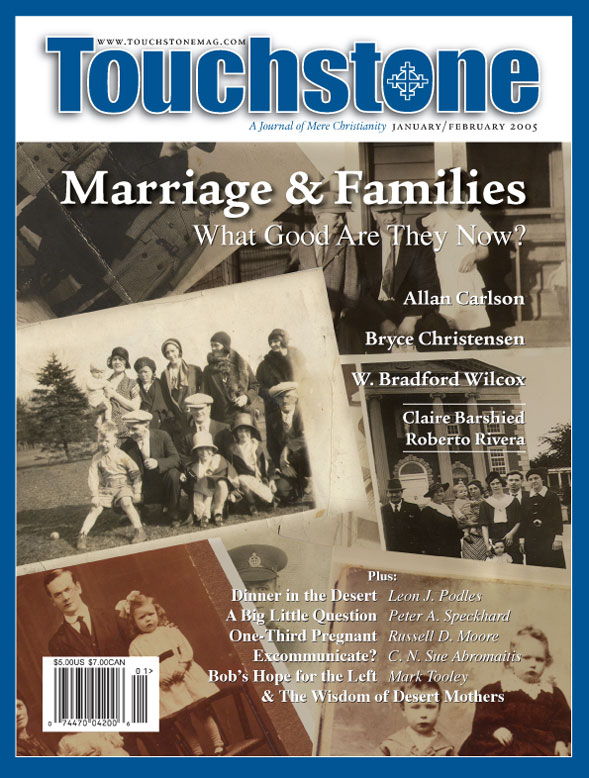California Dreaming
Stem-Cell Optimism Misplaced
“A sign of Californians’ deeply rooted optimism about science,” is how the Pittsburgh Post-Gazette described California’s decision to borrow $3 billion to fund research on therapeutic cloning. Proposition 71 provides $300 million a year for ten years. In contrast, the National Institutes of Health currently allocate about $500 million a year for all national research on arthritis and related diseases.
The obvious moral arguments against embryonic stem-cell research and human cloning have been raised in the pages of Touchstone, but we can also ask: Is this optimism warranted? Will embryonic stem cells produce the wonders promised, most famously by the late Christopher Reeve and John Edwards, who declared in opposition to President Bush’s policy that if John Kerry were elected, he would lift the ban and Christopher Reeve would walk? I think not.
And so we must ask: Why do so many scientists and members of the public want this research anyway, to the extent of putting an already debt-ridden state into further debt?
It takes very little technical investigation to see that California’s optimism is not warranted by the facts we know. I do medical research in the fields of orthopedics and neuroscience, and the two major meetings of orthopedic researchers I have attended in the past six months offered 28 sessions highlighting research using stem cells. Scientists from around the world presented the results of their studies.
The research is incredibly promising. Using stem cells, it is likely that we will be able to grow new bone to treat bone tumors, and even grow new cartilage to cure arthritis in its early stages. It is perhaps the most promising advance in medical science in the past forty years. However, of the 28 presentations on stem cells, only one involved embryonic stem cells—and that researcher reported negative results. He found that the stem cells derived from embryos that he hoped to develop into cartilage began to develop a pulse, like a heartbeat, after three days. They were uncontrollable.
For those who do not wish to sit through long medical research conferences, a quick glance at the table of contents of the medical journal Stem Cells & Development (available online) shows the same trend: Most successful studies today are being done using non-embryonic stem cells. (Words in the article titles like “bone marrow,” “mesenchymal,” “adipose,” “amniotic fluid,” and “umbilical cord” are giveaways, if you have trouble parsing the titles.)
The promising stem-cell work uses stem cells from adult neural tissue or bone marrow or adipose tissue (fat), or from tissues associated with the umbilical cord and placenta. These have been found to be more controllable in their growth under laboratory conditions. Recent studies have shown that stem cells derived from these sources hold great promise for treating disorders like diabetes and ALS (Lou Gehrig’s disease), to name but two. Embryonic stem-cell research has had relatively poor success to date, mostly due to the uncontrollability of the cellular differentiation process.
Why the Optimism?
So why is there such optimism in my native state for embryonic stem-cell research? Why have politicians and scientists not pressed equally hard for funding for research using stem cells from other sources, now the obviously superior technology? (Think what could be done with $3 billion applied to technologies that we already know work.) There are at least two explanations why so many scientists are arguing for funding, at great cost, an obviously inferior technology, and why a majority of the voting public has agreed with them.
First, scientists do not like to be restricted in any way. While scientists do not typically make good protesters, they have rallied behind research on embryonic stem cells because they are opposed to the government’s telling them what they can and cannot study. Scientists do not like being told they cannot work on human embryos and resent the federal government’s refusal to fund such research (except on stem-cell lines already created).
Thomas S. Buchanan is the George W. Laird Professor of Mechanical Engineering and Biomedical Engineering at the University of Delaware. He has studied at UCSD, Northwestern University, and MIT, and has held visiting professorships at the University of Western Australia and the University of Aix-Marseille. He has served as department chairman, deputy dean, and institute director, president of the American Society of Biomechanics, and editor-in-chief of the Journal of Applied Biomechanics. He is on the Board of Trustees of Saint Katherine College, the editorial board of Touchstone, and the board of The Fellowship of St. James.
subscription options
Order
Print/Online Subscription

Get six issues (one year) of Touchstone PLUS full online access including pdf downloads for only $39.95. That's only $3.34 per month!
Order
Online Only
Subscription

Get a one-year full-access subscription to the Touchstone online archives for only $19.95. That's only $1.66 per month!
bulk subscriptions
Order Touchstone subscriptions in bulk and save $10 per sub! Each subscription includes 6 issues of Touchstone plus full online access to touchstonemag.com—including archives, videos, and pdf downloads of recent issues for only $29.95 each! Great for churches or study groups.
Transactions will be processed on a secure server.
more from the online archives

33.2—March/April 2020
Christian Pro-Family Governments?
Old & New Lessons from Europe by Allan C. Carlson

27.6—Nov/Dec 2014
Tales of Forbidden Stereotypes
Real-Life Men & Women & the Tragic Loss of Human Comedy by Anthony Esolen
calling all readers
Please Donate
"There are magazines worth reading but few worth saving . . . Touchstone is just such a magazine."
—Alice von Hildebrand
"Here we do not concede one square millimeter of territory to falsehood, folly, contemporary sentimentality, or fashion. We speak the truth, and let God be our judge. . . . Touchstone is the one committedly Christian conservative journal."
—Anthony Esolen, Touchstone senior editor







